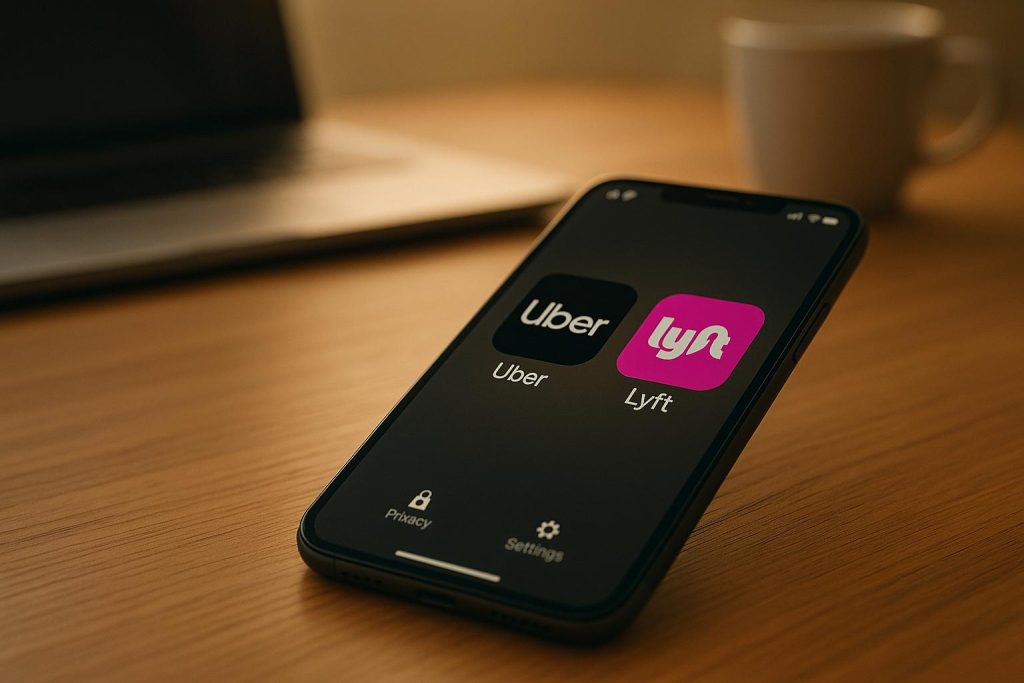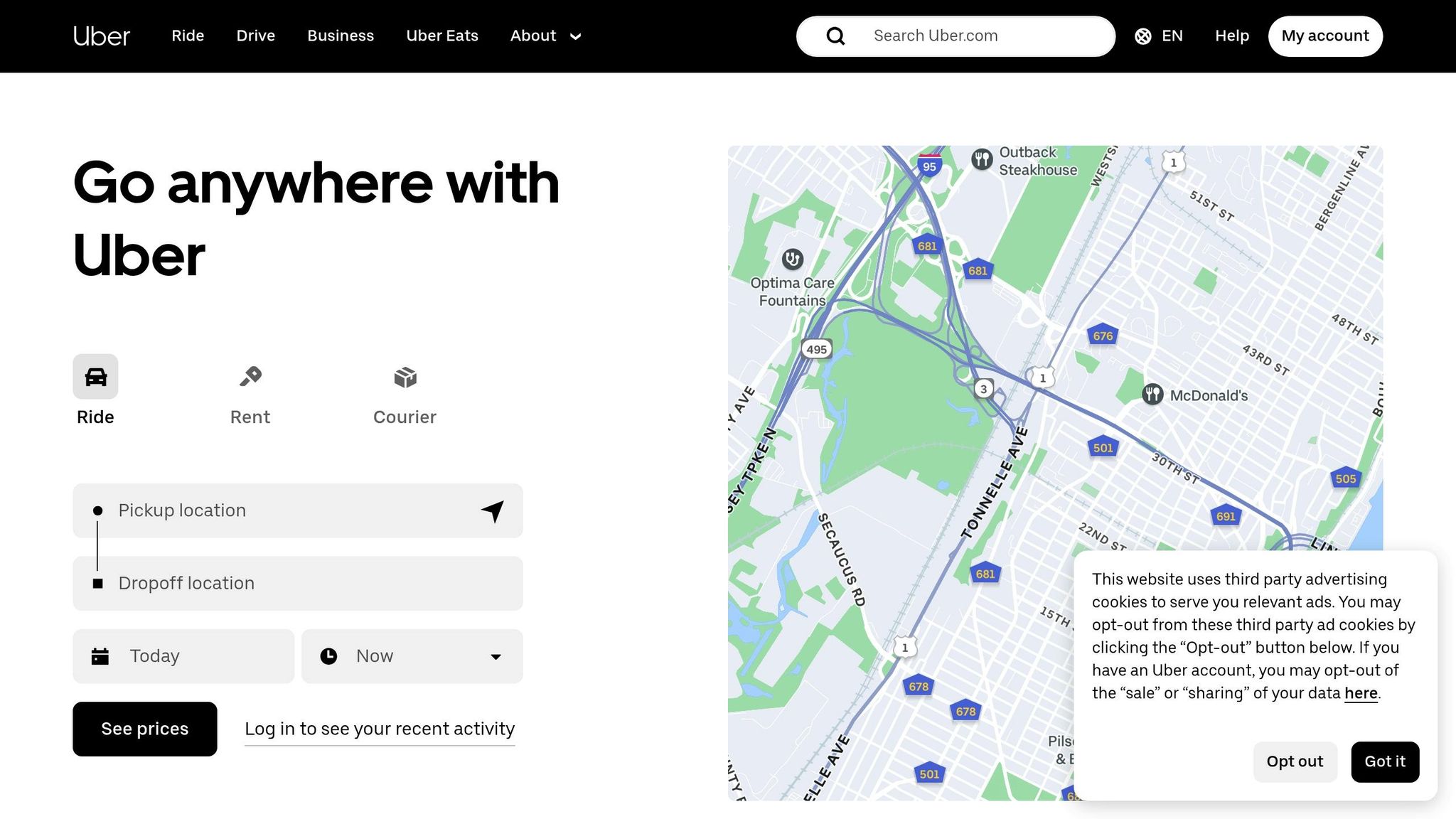Uber and Lyft collect personal data like ride histories, payment details, and location information, but their data retention and privacy policies differ. Here’s what you need to know:
- Data Collection: Both platforms require a phone number and gather details like location and payment info. Using temporary non-VoIP numbers (e.g., from MobileSMS.io) can protect your privacy.
- Data Storage: Data is stored as long as legally or operationally required. Even after account deletion, some data may be retained for compliance.
- User Control: Both apps offer privacy settings to manage data visibility, including location sharing, contact access, marketing preferences, and trip history deletion.
Quick Comparison
| Feature | Uber | Lyft |
|---|---|---|
| Phone Number Use | Requires phone number; supports privacy tools like MobileSMS.io | Same as Uber |
| Data Retention | Retains data per legal and business needs | Similar policy |
| Privacy Settings | Location, contacts, marketing, trip history | Same as Uber |
Key Tip: Use tools like MobileSMS.io for temporary phone numbers to keep your personal info private while using ride-sharing apps.
Full Show: Deleting Your Digital Footprint and Uber vs. Lyft
Data Collection Methods
Uber and Lyft both require users to provide a phone number during registration. If you’d prefer not to share your personal number, using a temporary, non-VoIP number could be an option. However, the platforms don’t provide much detail about the exact types of data they collect, leaving room for further exploration.
Data Categories
While the exact data categories aren’t clarified, it’s safe to assume that standard details like location and payment information are part of the information collected for operational purposes.
Third-Party Data Sharing
Information about how Uber and Lyft share data with third parties is not clearly outlined.
Data Storage Time Limits
Both platforms manage user data retention based on legal obligations, operational needs, and internal policies. The length of time data is stored depends on the type of data, legal regulations, and company-specific rules.
Storage Duration
Basic account details are kept while the account is active. Information like trip histories, payment records, and location data is stored in line with legal and business requirements. For exact timelines, check the privacy policies of each service. These practices also influence how user data is managed during and after account deletion.
Account Removal Process
Deleting an account involves multiple verification steps to confirm the user’s identity. Even after an account is removed, some data may still be kept to meet legal requirements.
Special Data Handling
Sensitive information, such as payment and location data, is protected through encryption and restricted access. For more details on how this data is handled, consult the latest privacy policies.
sbb-itb-5a89343
User Privacy Settings
Uber and Lyft include privacy settings that allow users to manage their personal information and control how much of their data is visible. These features work alongside the platforms’ data retention policies, giving users more control over their privacy.
Phone Number Protection
Keeping your phone number private is a key concern for ride-sharing users. One way to do this is by using temporary, non-VoIP numbers when signing up or verifying your account.
For instance, in February 2025, traveler John S. used a German disposable number (+49) from MobileSMS.io to register with Uber while in Germany. This approach kept his primary US number private while maintaining full access to the app’s features.
MobileSMS.io provides temporary and long-term non-VoIP numbers that integrate smoothly with platforms like Uber and Lyft, offering an extra layer of privacy.
In addition to phone number protection, both Uber and Lyft include tools to help users control their data visibility.
Data Control Options
Users can customize various aspects of their data through privacy settings available in the apps:
| Feature | Purpose | User Control |
|---|---|---|
| Location Sharing | Determines when location data is collected | Can be restricted to "While Using App" |
| Contact Access | Shares address book for split fare features | Optional and can be disabled |
| Marketing Communications | Manages promotional messages and updates | Opt-out available in app settings |
| Trip History | Keeps a record of past rides and locations | Can be manually deleted |
These settings are accessible in the privacy menu of each app. Additionally, both platforms allow users to download a personal data archive for review.
Conclusion
Uber and Lyft both take measures to secure data, but their approaches to user control vary. For those looking to maintain privacy, MobileSMS.io provides temporary non-VoIP numbers, adding an extra layer of protection. Here are some steps to help manage your privacy effectively:
| Action | Benefit | How to Do It |
|---|---|---|
| Use temporary numbers | Keeps your personal number private | Use MobileSMS.io for verification |
| Review stored data | Limits unnecessary data retention | Check the privacy settings in the app |
| Clean up accounts | Removes outdated information | Delete old ride history or unused accounts |
FAQs
What happens to my data when I delete my Uber or Lyft account?
When you delete your Uber or Lyft account, both companies have data retention policies that determine how long your information is stored. Typically, they retain certain data for legal, security, or regulatory purposes, even after account deletion. However, the specifics of how long and what data is kept can vary between the two platforms.
If maintaining your privacy is a priority, consider using services like MobileSMS.io to protect your personal phone number when signing up for apps. This ensures added privacy and security while minimizing the risk of your personal information being exposed.
What kind of data do Uber and Lyft collect, how do they share it, and how can I manage my privacy?
Both Uber and Lyft collect a range of data, including your ride history, location information, payment details, and personal account information. They may also share some of this data with third parties, such as advertisers, business partners, or government authorities, in compliance with their privacy policies.
To manage your privacy, you can review and adjust your account settings on each platform. For example, you can limit location tracking, opt out of specific data sharing, or delete your account if needed. For added privacy, consider using services like MobileSMS.io to protect your personal phone number during account setup or verification, ensuring your information stays secure.
How can I protect my personal information when signing up for ride-sharing apps like Uber or Lyft?
To safeguard your privacy when creating accounts for ride-sharing apps, you can use temporary phone numbers. Services like MobileSMS.io provide non-VoIP, SIM-based numbers that help keep your personal phone number private. These numbers are ideal for SMS verification during sign-ups and ensure your personal information is protected from spam or potential data breaches. This simple step can add an extra layer of security to your online presence.


